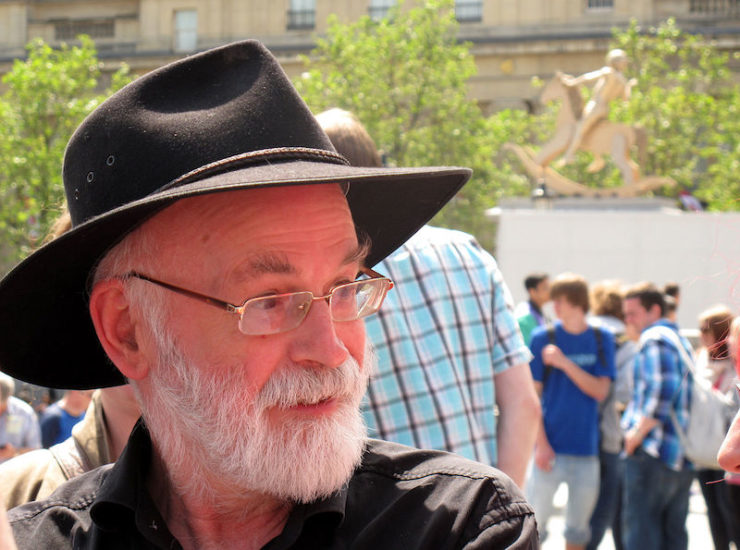Last week, the internet was fighting over the legacy of Terry Pratchett and I thought I wouldn’t say anything about it at all.
That’s not the interesting part. Because anyone who has ever written anything on the internet (even your little blurbs on social media) knows that this space is a void of thoughts and dreams and lies and the best/worst intentions, and that people are bound to believe exactly whatever they want to believe. That’s why a global pandemic is still raging when it could have been halted ages ago. That’s why my mom switched on a UFO conspiracy special while visiting for my birthday despite my protestations. That’s why a sensible sort of phrase like “gun control” can cause fits of rage, even after your neighbors get murdered in public spaces.
That’s why some people still won’t believe trans women are women.
Buy the Book


Never Say You Can’t Survive
This is what the fight was about, by the way. The clash over Terry Pratchett’s work and what it meant was really a battle about whether trans people were allowed to exist, because that’s what a lot of internet fights are about lately. Some folks who were annoyed with Neil Gaiman’s work decided to make a dig at him by suggesting that his friend and co-writer wouldn’t have held with this transgender business, and believed that they proved said case by citing the Discworld Witches books. Because they’re about women, you see.
Do you see? I’m not even sure I do.
Pratchett’s daughter, Rhianna, weighed in on this argument with all the horror it was due. She implored people to read his books to make the case clear, and denounced the very idea that her father could have been transphobic. Many fans, trans and otherwise, took to Twitter to talk about how welcoming and kind he was to all people in person. Articles were written citing the manner in which Pratchett tackled ideas of gender variance, ignorance, prejudice, and plain old human cruelty in his work. But a couple of opposition arguments got airtime as well, including one (which I have no intention of linking to here) by known transphobic pundit Sarah Ditum, which basically argued that because Pratchett was dead, no one—including his own daughter or close friends—could ever truly know what his opinion on this “new” subject was.
This perspective is comical for a few reasons, the first being that I’m pretty sure that Pratchett’s own daughter would have a solid grasp on his morals. (And yes, this is a morality issue, because denying people’s right to exist free of prejudice is not a cool pastime.) The second is that while reader interpretation is a woolly thing, we actually know a great deal about Pratchett’s perspective because he was such a prolific author. His output was astounding, the body of his work encompassing a wild number of topics. The third is that citing the relative “newness” of transgender identities is Lazy Transphobe Fight Tactic #1. While the terminology is ever-evolving, transness is not new, and any upswing in visible transgender people can be easily put down to a lessening (no matter how slight) of bigotry in the general populace. Beyond all these points, the argument just pissed me off. It lacked textual evidence, eschewed common sense, and disguised pettiness as intellectualism.
So I decided to write this out of sheer spite—but also to add one more trans perspective to the pile of trans perspectives on Pratchett’s work. Because readers can and will interpret art exactly as they want and need to, but the more we trans folks analyze and mull and get our grubby gender-defiant hands all over things, the more we assert our right to be anywhere at all.
There has already been much said about Cheery Littlebottom and Discworld dwarves in general, about Nobby and his eventual appreciation for women’s clothes, about the Pratchett stories that tackle ideology and inflexibility and resistance to change. There has been much said about the author’s belief that people were flawed and plain and sometimes incredibly ignorant, but also marvelous and strange. These are all good points.
I’ve got two that keep circling in my head. One of them being that TERFs were trying to lay claim to certain female characters and stories within Pratchett’s body of work, but unless you’re specifically told that a character has given birth to children, or you’re given a description of their body in explicit (and probably unnecessary) detail, you’ve got no way of knowing that any given character is cisgender. This is important because part of the argument that transness is “new” or “trending” is bound up in this very issue.
We’ve always been around. You just didn’t see us.
And this isn’t bothering to get into the fact that gender roles are a thing that Pratchett gleefully exploits within his work because he knew full well that anyone could be anything. Even within the sharp gendered confines of Discworld magic—men to wizardry and women to witch covens—he breaks those rules with great deliberateness. Pratchett himself may not have intentionally created a trans witch or wizard, but that doesn’t mean that none of those characters are trans. He would be the first person to acknowledge how stories behave in another person’s hands, and how their reading will change what’s on the page.
The other point that turns over and over in my head is this: When people on the Discworld die, they go… exactly where they believe they’ll go. Whatever afterlife (or lack thereof) they imagine is precisely what they will face.
Why is this relevant? Aside from being deliciously egalitarian in terms of religious hierarchy, it is one of the first pieces of worldbuilding that reveals a core tenet of Pratchett’s oeuvre: Specifically, that reality is made up of beliefs. And he never means belief in a strictly faith-driven sense—for Pratchett, belief can be as specific as a spell and as broad as the concept of mercy. Belief is how we make sense of the world. Belief is a building block to realness, a cornerstone of the cosmos, a litany against fumbling in the eternal dark.
On the current cultural battleground, TERFs make the argument that gender is an immutable biological fact made up of chromosomes. Scientists keep insisting that this is not how biology actually works, but transphobic groups are adamant on this point. You cannot be anything other than the gender you were assigned accordingly to your body’s specific parts, because that shape is the fact of you. That shape is inescapable.
Trans people know that gender is not shape. It is not parts, or XYs, or a combination of angles and curves. Gender is a feeling, a euphoria, an absence, a specific place that can only be accessed by some combination of performance and acceptance and hope. It needs the support of friends and loved ones, it needs community, it needs to be tended like a funky overgrown garden.
Gender has to be believed in order to exist.
And if you think for one moment that Terry Pratchett would deny a trans person’s understanding of their own gender—their belief of themselves—when he told us over and over that belief is a fundamental facet of reality? Well… you sound small-minded and desperate.
Something that he taught his readers to beware of, for the record.
The truth of the matter is that our current environment has seen TERFs looking to powerful figures of fiction for legitimacy. They’ve got the author of Harry Potter firmly entrenched with them, but other potential recruits (they tried to tally up Margaret Atwood and Stephen King and were publicly rebuffed) haven’t worked out so well. So having been burned more than once by the living, they have turned to the dead to try and make their points. It’s a disgusting tactic, frankly, and transparent to boot: Tell us all that you’re certain a dead man would side with you, and when his own child denies you, write a thinkpiece about why her thoughts don’t count.
These are our battlegrounds now. This is one of many places where we’re required to fight for our right to live openly. On Twitter. In 280-character bursts of fury and pain. The only reason I can believe we’ve arrived at this tediousness is because I’ve read the likes of Terry Pratchett, and he showed me that people are inevitably going keep peopling on about things. Bless their atrophied little hearts.
And while these sorts of fights may be inevitable, and it often feels that there’s no winning in engaging with it at all, I am of the same mind about this that I am about fascists trying to appropriate Norse imagery or punk rock or beloved video games: This doesn’t belong to you. And if you keep pushing, we’ll slap it right out of your hands in front of JKR and everyone.
You can’t have Sir Terry. He’s ours.
Emmet Asher-Perrin is going to keep insisting that Discworld’s Death is nonbinary and uses he/him pronouns to annoy people. You can bug them on Twitter, and read more of their work here and elsewhere.










